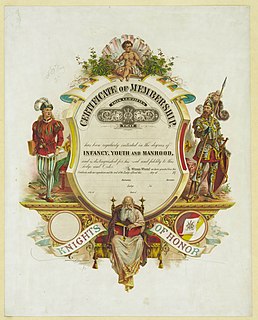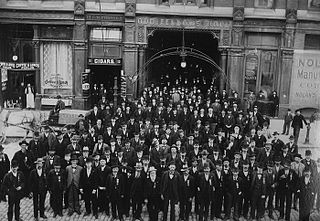Related Research Articles

The Improved Order of Red Men is a fraternal organization established in North America in 1834. Their rituals and regalia are modeled after those assumed by men of the era to be used by Native Americans. Despite the name, the order was formed solely by, and for, white men. The organization claimed a membership of about half a million in 1935, but has declined to a little more than 15,000.
The Independent Order of Vikings is a fraternal organization active in a number of American states.

The Knights of Honor, was a fraternal order and secret society in the United States in the late 19th and early 20th century. The Knights were one of the most successful fraternal beneficiary societies of its time.
The Slovene National Benefit Society, known in Slovenian as Slovenska narodna podporna jednota, and by its Slovene initials S.N.P.J. is an ethnic fraternal benefit and social organization for Slovene immigrants and their descendants in the United States. Founded in 1904, it is headquartered in suburban Pittsburgh, Pennsylvania, USA near Imperial. SNPJ publishes a newspaper, Prosveta.

Odd Fellows is an international fraternity consisting of lodges first documented in 1730 in London. The first known lodge was called Loyal Aristarcus Lodge No. 9, suggesting there were earlier ones in the 18th century. Notwithstanding, convivial meetings were held "in much revelry and, often as not, the calling of the Watch to restore order." Names of several British pubs today suggest past Odd Fellows affiliations. In the mid-18th century, following the Jacobite risings, the fraternity split into the rivaling Order of Patriotic Oddfellows in southern England, favouring William III of England, and the Ancient Order of Oddfellows in northern England and Scotland, favouring the House of Stuart.

A benefit society, fraternal benefit society, fraternal benefit order, or mutual aid society is a society, an organization or a voluntary association formed to provide mutual aid, benefit, for instance insurance for relief from sundry difficulties. Such organizations may be formally organized with charters and established customs, or may arise ad hoc to meet unique needs of a particular time and place. Many major financial institutions existing today, particularly some insurance companies, mutual savings banks, and credit unions, trace their origins back to benefit societies, as can many modern fraternal organizations and fraternal orders which are now viewed as being primarily social; the modern legal system essentially requires all such organizations of appreciable size to incorporate as one of these forms or another to continue to exist on an ongoing basis.
Fraternal Order Orioles is a social and charitable organization that was founded in August 1910. The organization currently consists of about 54 local Nests and affiliated Auxiliaries located in 9 States in the eastern United States.
A fraternal order is a fraternity organised as an order, with traits alluding to religious, chivalric or pseudo-chivalric orders, guilds, or secret societies. Contemporary fraternal orders typically have secular purposes, including social, cultural and mutually beneficial or charitable aims. Many friendly societies, benefit societies and mutual organisations take the form of a fraternal order.

The Ancient Order of United Workmen (AOUW) was a fraternal organization in the United States and Canada, providing mutual social and financial support after the American Civil War. It was the first of the "fraternal benefit societies", organizations that would offer insurance as well as sickness, accident, death and burial policies.
The German Order of Harugari, sometimes called the Ancient Order of Harugari or by its German name, Der Deutsche Orden der Harugari, is a mutual benefit and cultural association of German Americans founded in New York City in 1847 that was at one time the largest German secret society in the United States.
There have been a number of interlocking fraternal orders known as the beavers. The Fraternal Order of Beavers was created in 1911. The relationships between these and the Beavers Reserve Fund Fraternity, Beavers National Mutual Benefit and the National Mutual Benefit is complex. The North American Order of the Beaver was founded in 1990.
The American Fraternal Alliance (AFA) is an umbrella group of fraternal orders in the United States. It was founded as the National Fraternal Congress of America in 1913, in Chicago and adopted its current name in 2011.
The Degree of Honor Protective Association is a fraternal benefit association. It was originally organized as a female auxiliary to the Ancient Order of United Workmen, but split off in 1910 to become its own independent group.
The American Legion of Honor was a fraternal benefit order that was active in the late 19th century and early 20th century. In its heyday, it was one of the best known benefit societies.
The Knights and Ladies of Honor was a highly successful and popular American fraternal benefit organization in the late 19th and early twentieth century. It is perhaps the first major fraternal benefit organization to adopt the idea of diversity allowing non-white persons and racial groups to be recognized and establish lodges.
References
- ↑ Alan Axelrod International Encyclopedia of Secret Societies and Fraternal Orders New York; Facts on File, inc 1997 pp.15, 265
- ↑ Preuss, Arthur A Dictionary of Secret and other Societies St. Louis: B. Herder Book Co. 1924; republished Detroit: Gale Reference Company 1966; pp.328-9